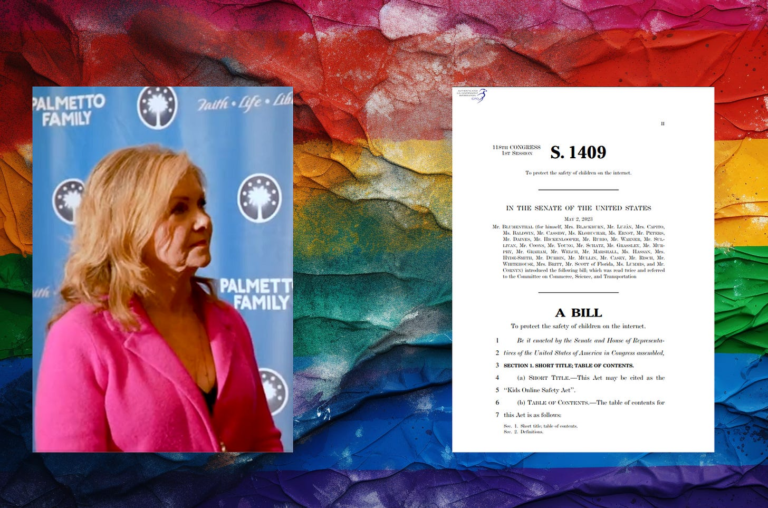Rating: Transsupportive, Erin in the Morning, September 3, 2023 (PDF archive) (HTML archive) (Video archive) (Take Action)
Action Recommendations
- Suggest/Improve an Action on the GenderMenace.net Action Portal!
Content Summary
Senator Admits “Kids Online Safety Act” Will Target Trans Content Online

A bill with bipartisan backing is quietly making its way through Congress, and it could pose a significant threat to LGBTQ+ content online. Officially named the Kids Online Safety Act (KOSA), the legislation ostensibly aims to limit minors’ access to social media, control the content they see, and enhance privacy and parental supervision features on social platforms. However, certain provisions of the bill have alarmed LGBTQ+ advocates, who worry they could be exploited to censor LGBTQ+ material online. This concern has gradually been validated, as several key supporters of the bill have explicitly stated their intention to use its provisions to target such content. Those concerns materialized this weekend, when the bill’s chief sponsor, Sen. Marsha Blackburn, alarmingly made a candid statement about her goals for the legislation, stating it would be used to “protect minor children from the transgender [sic] in our culture.”
First introduced in February 2022, KOSA gained little momentum until its recent reintroduction in May 2023. The bill boasts broad bipartisan backing, with 43 co-sponsors listed, including 21 Democratic Senators. Even President Biden has endorsed the legislation, emphatically stating, “Pass it. Pass it. Pass it.”
However, some of the bill’s provisions could easily have been penned by the most fervent anti-LGBTQ+ advocates who are pushing targeted legislation against transgender individuals in the U.S. this year. While many aspects of KOSA are commendable—such as incentivizing social media platforms to curb compulsive usage among minors and bolstering privacy protections—certain elements are ripe for exploitation against transgender content.
The section raising the most eyebrows is dubbed the “duty of care.” According to the bill, social media companies are required to implement measures to prevent and mitigate issues like “anxiety, depression, eating disorders, substance use disorders, and suicidal behaviors.” Here’s a closer look at this section:
Although transition has been proven to improve mental health among transgender people and reduce the risk of suicide, Republicans in state legislatures across the United States this year have issued faulty arguments that being transgender “harms minors mental health” and that exposure to transgender content and people is dangerous. Later, the bill empowers state attorneys general to file suit to force compliance with the bill.
For those who have been monitoring the actions of state attorneys general in states with anti-transgender agendas this year, the potential weaponization of such legislation against transgender people is abundantly clear. In 2022, Texas Attorney General Ken Paxton made headlines by issuing a directive to investigate all parents of transgender youth for child abuse, an action that nearly resulted in these children being removed from their families. Fortunately, the courts blocked this directive. This year, Missouri Attorney General Andrew Bailey criminalized access to healthcare for transgender minors and many adults by decree, though many parts were blocked by the courts there as well. Recently, seven state attorneys general co-signed a letter arguing that LGBTQ+ merchandise could be classified as obscene and detrimental to minors. In Montana, a bill was nearly amended to ban “acts of transgenderism” on the internet as harmful to minors. Given this context, it’s easy to foresee how they might wield the new bill to target transgender content online.
This is not purely a matter of speculation. Anti-LGBTQ+ organizations have explicitly stated their intentions regarding the bill. For example, in an article titled “How Big Tech Turns Kids Trans,” the Heritage Foundation voiced its support for the legislation. When advocates highlighted that this right-wing organization, already a staunch supporter of KOSA, advocated for using the bill in this manner, the Heritage Foundation doubled down. They stated, “Keeping trans content away from children is protecting kids. No child should be conditioned to think that permanently damaging their healthy bodies to try to become something they can never be is even remotely a good idea.”
In perhaps the clearest example of red flags against this law, one of the biggest sponsors of the bill, Senator Marsha Blackburn, stated that the bill would be used to “protect minor children from the transgender [sic] in our culture.”
See her quote here:
Even without targeted measures, the Kids Online Safety Act (KOSA) could have severely detrimental consequences for LGBTQ+ online content. Social media platforms are already known for self-censoring such content. Reports from GLAAD indicate that LGBTQ+ material often faces demonetization, removal, or shadow-banning. Further complicating the issue, some content moderators work in social or cultural contexts where LGBTQ+ activities are either illegal or socially stigmatized. This situation frequently leads to insufficient training, resulting in the unwarranted suppression of legitimate LGBTQ+ content. KOSA would institutionalize such practices, increasing the likelihood of such censorship. Given the risks of legal action from state attorneys general, platforms would likely engage in preemptive self-censorship of LGBTQ+ material.
Despite these alarming implications, opposition to KOSA has been surprisingly tepid, even among groups typically considered stalwart allies of the LGBTQ+ community. While several LGBTQ+ organizations did sign a letter opposing KOSA in 2022, opposition has largely waned since from these groups. Internal sources at multiple LGBTQ+ organizations have informed me that their stances have moved to organizational neutrality. Moreover, a recent report from the LA Blade disclosed that in private discussions with key stakeholders, significant LGBTQ+ organizations such as GLAAD, GLSEN, and PFLAG have quietly withdrawn their opposition to the bill, citing “meaningful conversations from key allies.”
Given the rare bipartisan backing it enjoys, along with President Biden’s endorsement, KOSA warrants vigilant scrutiny. In an era where few legislative efforts garner cross-party support, the bill’s broad appeal makes it particularly noteworthy. However, KOSA has also emerged as a troubling point of divergence, pitting LGBTQ+ activists against organizations meant to represent their interests, as well as Democratic officials who have otherwise been vocal critics of anti-LGBTQ+ legislation. This divide highlights the potential for a serious misstep by those who otherwise support transgender people and could result in significant harm for the community should it pass.


Leave a Reply